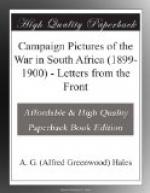President Steyn is a man of a notable type. He is a big man physically, tall and broad, a man of immense strength, but very gentle in his manner, as so many exceptionally strong men are. He has a typical Dutch face, calm, strong, and passionless. A man not easily swayed by outside agencies; one of those persons who think long and earnestly before embarking upon a venture, but, when once started, no human agency would turn him back from the line of conduct he had mapped out for himself. He is no ignorant back-block politician, but a refined, cultured gentleman, who knows the full strength of the British Empire; and, knowing it, he has defied it in all its might, and will follow his convictions to the bitter end, no matter what that end may be. He introduced me to a couple of gentlemen whose names are very dear to the Free Staters, viz., Messrs. Fraser and Fischer, and whilst the interview lasted nothing was talked of but the war, and it struck me very forcibly that not one of those men had any hatred in their hearts towards the British people. “This,” said the President, “is not a war between us and the British people on any question of principle; it is a war forced upon us by a band of capitalistic adventurers, who have hoodwinked the British public and dragged them into an unholy, an unjust struggle with a people whose only desire was to live at peace with all men. We do not hate your nation; we do not hate your soldiers, though they fight against us; but we do hate and despise the men who have brought a cruel war upon us for their own evil ends, whilst they try to cloak their designs in a mantle of righteousness and liberty.” I may not have given the exact words of the President, as I am writing from memory, but I think I have given his exact sentiments; and, if I am any judge of human nature, the love of his country is the love of his life.
“StoppingA few.”
I saw him first, years ago upon a station in New South Wales; a neat, smart figure less than nine stone in weight, but it was nine stone of fencing wire full of the electricity of life. He was in the stockyard when I first saw him, working like any ordinary station hand, for it was the busy portion of the year, and at such times the squatters’ sons work like any hired hand, only a lot harder, if they are worth their salt, and have not been bitten by the mania for dudeism during their college course in the cities. There was nothing of the dandy about this fellow. From




